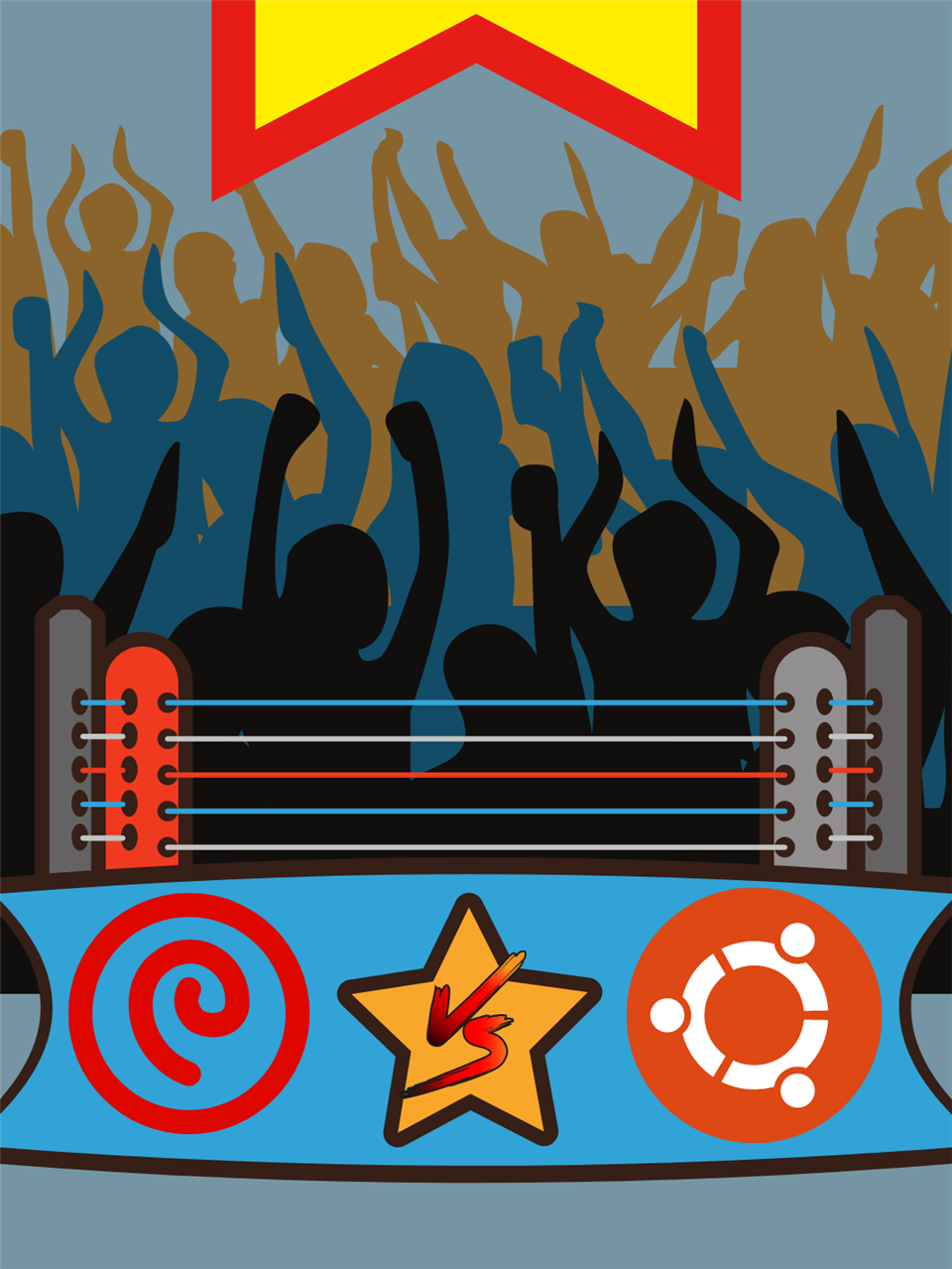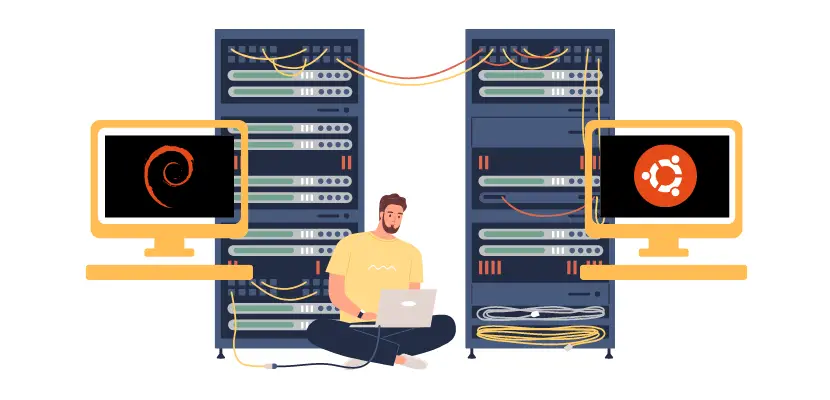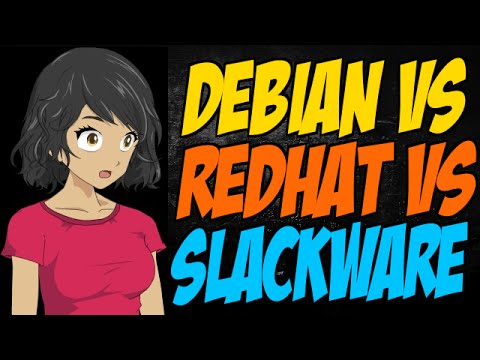Debian vs. Slackware: Tradition and Stability in Linux Distribution

In the realm of Linux operating systems, Debian and Slackware stand out as two venerable stalwarts with distinctive approaches to software distribution and stability. While both offer a wealth of features and packages, they diverge in their philosophies and target audiences. Let’s delve into the nuances of these distributions and explore the factors that make them unique.

1. Stability and Long-Term Support:

Debian:
Debian is renowned for its rock-solid stability and long-term support (LTS) releases, making it a favored choice for production environments and servers. LTS releases receive security updates and bug fixes for many years, ensuring a stable and secure operating system for mission-critical applications. This stability comes at the cost of not having the latest software versions immediately available.
Slackware:
Slackware, on the other hand, emphasizes a more bleeding-edge approach, prioritizing the availability of the most recent software packages. This strategy appeals to users who value cutting-edge software and are willing to trade stability for access to the latest features and applications. However, Slackware’s focus on bleeding-edge software can sometimes lead to occasional system instability.
2. Package Management and Software Selection:
Debian:
Debian’s package management system is highly regarded for its extensive and well-maintained repository of software packages, encompassing both open-source and proprietary applications. Its package management tools, such as APT (Advanced Packaging Tool), offer a user-friendly interface for searching, installing, and updating software.
Slackware:
Slackware takes a more traditional approach to package management, employing a simple hierarchical file structure. This approach grants users more control over the installation and organization of software but requires a deeper understanding of the underlying system. Slackware’s package management system is less user-friendly compared to Debian’s, but it provides greater flexibility for advanced users.
3. Community and Documentation:
Debian:
Debian boasts a large and active community of contributors and users who provide extensive documentation, support forums, and tutorials. This robust community makes it easier for users to find help and resources, particularly for beginners who may encounter issues or have questions about the operating system.
Slackware:
Slackware has a smaller but dedicated community, known for its expertise and willingness to assist fellow users. However, the documentation and support resources may be limited compared to Debian’s extensive offerings. Users may need to rely more on online forums and community discussions to find answers to their queries.
4. Customization and Flexibility:
Debian:
Debian offers a high level of customization and flexibility through its modular approach to software installation. Users can select and install specific software packages according to their needs, allowing them to tailor the system to their requirements.
Slackware:
Slackware provides even greater flexibility and customization options due to its minimal default installation. Users have complete control over the software they install, the configuration of the system, and the underlying packages. This level of control appeals to advanced users who prefer a more hands-on approach to system management.
5. Target Audience and Use Cases:
Debian:
Debian’s stability, extensive software repository, and user-friendly package management make it a suitable choice for servers, production environments, and users who prioritize stability and long-term support. It is also popular for desktop usage, particularly among users who value a wide range of software options and a stable operating system.
Slackware:
Slackware’s focus on bleeding-edge software and greater flexibility appeal to advanced Linux users, system administrators, and developers who require the latest software versions and complete control over their systems. Its minimalist approach and emphasis on user customization make it a favorite among experienced Linux enthusiasts.
In summary, Debian and Slackware represent two distinct approaches to Linux distribution. Debian offers stability, long-term support, and a vast software repository, making it a reliable choice for production environments and users who prioritize stability. Slackware, on the other hand, emphasizes the availability of the latest software, greater flexibility, and a minimalist approach, catering to advanced users who value customization and control over their systems. Both distributions have their strengths and target audiences, making them valuable options in the Linux landscape.## Debian Vs. Slackware: Tradition And Stability
Executive Summary:
Debian and Slackware are two of the oldest and most respected Linux distributions and both offer stability, security, and a wide range of software.
This article explores the philosophies, strengths, and weaknesses of each distribution, enabling you to choose the one that best suits your needs.
Introduction:
Debian and Slackware are two venerable Linux distributions with over two decades of history. Over the years, they have earned a reputation for stability, security, and a vast array of software packages. Yet, they also have different approaches to distribution design, resulting in diverse user experiences. In this article, we will compare and contrast Debian and Slackware, helping you decide which distribution is best for you.
Philosophical Differences:
Debian and Slackware have different philosophies that drive their design and development. Debian’s philosophy emphasizes stability, security, and free software, whereas Slackware places the focus on simplicity, customizability, and user choice.
Debian:
Stable and Secure:
Debian is a stable and secure Linux distribution that suits servers and workstations. It offers a wide range of software packages, making it an ideal choice for corporate or personal use.
- Debian’s stability is achieved through its conservative approach to package updates. By prioritizing testing and stability over bleeding-edge features, Debian ensures its systems operate reliably.
- Security is paramount in Debian. With regular security updates and dedicated security teams, Debian provides a robust defense against vulnerabilities and exploits.
- Debian offers a vast selection of software packages. Its comprehensive repositories contain thousands of applications, catering to diverse needs and requirements.
Slackware:
Simple and Lightweight:
Slackware’s design minimalistic essence. Its simple design and lightweight nature make it an attractive option for experienced Linux users who value control and customizability.
- Slackware aims to achieve ultimate simplicity and efficiency. It adopts a KISS (Keep It Simple, Stupid) approach, avoiding unnecessary components and features.
- Unlike Debian, Slackware prioritizes local package management, which enables granular control over installations.
- The distribution offers a smaller software selection compared to other distros. This curated approach reduces the chances of conflicts and ensures system stability.
Packaging and Updates:
Different Update Cadences:
Debian and Slackware have different approaches to package management and update cadence, influencing the user experience.
- Debian employs a continuous model of rolling updates. This means that the distribution regularly issues updates for security patches and bug fixes. However, these updates are applied gradually, ensuring overall system stability.
- Conversely, Slackware updates adhere to a point-release schedule. Major releases occur every few years, followed by maintenance updates that provide security patches and minor enhancements.
Stability and Longevity:
Proven Track Records:
Debian and Slackware excel in stability and longevity, thanks to experienced development teams and skilled contributors.
- Debian’s longevity is derived from its adherence to its philosophical pillars. Its stable releases are supported for years, ensuring reliability and a predictable lifecycle.
- Likewise, Slackware’s stability is due to its conservative approach to change and careful selection of software packages. This conservatism helps maintain a consistent and reliable platform.
Community and Support:
Strong Open Source Ecosystems:
Debian and Slackware boast active and thriving open source communities, providing support and resources to users.
- Debian has a vast and active online community, offering support forums, mailing lists, and extensive documentation. Its community is also known for its dedication to free software principles.
- Slackware’s community, while smaller, is equally dedicated and supportive. The Slackware mailing list is a valuable resource for users seeking advice and assistance.
Conclusion:
Choosing the Right Distribution:
Ultimately, the choice between Debian and Slackware depends on your individual needs and preferences.
- If you prioritize stability, security, and a comprehensive software selection, then Debian is a compelling choice. Its long-term support, conservative update strategy. and extensive testing make it ideal for servers and production systems.
- If you value simplicity, control, and local package management, then Slackware is an excellent option. Its KISS approach, minimal design. and local package management offer granular customization and a more streamlined user experience.

Such a nice comparison between Slackware and Debian. Slackware is indeed the most stable distro, but that sometimes results in outdated software. rolling distros are good but lack stability.
Why compare these ancient distros? The likes of Alpine, Guix or Nix are way better!
I use slackware not only because of its stability but also because it is the closest thing to a unix system that i can find.
this is a nonsensical comparison. Slackware is only “stable” because they don’t make any changes. All they do is just package updates whenever upstream releases it.
Slackware stable is a relic of the past. It should die and the focus should be placed on current, actively maintained systems
Slackware is my favorite ancient operating system. Don’t get me wrong, but it should stay in the museum with other antiques.
This debate is fruitless. Both distros have their pros and cons. Use whatever suits you.
The real question is: why would you want to use either of these in the first place?
Slackware is the only distro that has never broken on me. It just works.
Debian is the most popular distro for a reason. It’s user-friendly, stable, and has a huge software library.
Slackware is great if you want to learn about how linux works. But for everyday use, i’d rather use something more modern like Arch or Gentoo.
I tried slackware once, but i couldn’t get used to the outdated software. I prefer rolling distros like Arch or Gentoo.
This is a great comparison of two of the oldest and most respected distros in the Linux world.
Slackware is the only distro that i trust to run my servers.